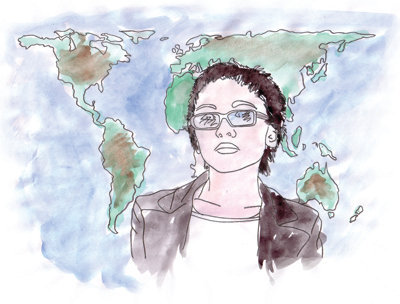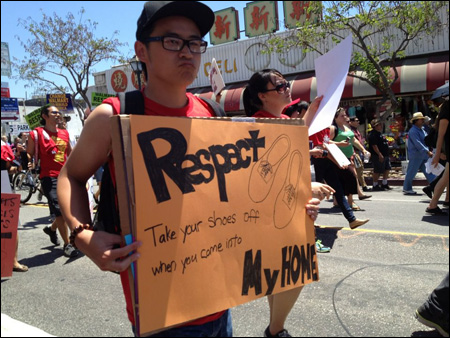A few days ago, the Australian Government released
The White Paper : Australia in the Asian Century, which "sets out a strategic framework to guide Australia’s navigation of the Asian Century."
The official website says more:
"The scale and pace of Asia’s transformation is unprecedented and the implications for Australia are profound. Australia’s geographic proximity, depth of skills, stable institutions and forward-looking policy settings place it in a unique position to take advantage of the growing influence of the Asian region.
The Australian Government commissioned a White Paper on Australia in the Asian Century to consider the likely economic and strategic changes in the region and what more can be done to position Australia for the Asian Century"
An example of an action that the paper raises is around a long-term investment in "Asia literacy", including mandating that schools across Australia will teach at least one of four priority Asian languages (Mandarin, Hindi, Indonesian, and Japanese).
This, of course, has interesting implications for our national identity. Australia has, colloquially, tended to be referred to (by others, and also self-referentially), as a "Western country," despite being more accurately geographically situated as an island in the South Pacific (Northwest of Aotearoa New Zealand, and mostly actually Southeast of our closest continental neighbour: Asia)...
The word "Western" is very loaded, of course, and I interpret this to mean that Australia tends to trace its national heritage to European, U.S. American, and Anglicised continental roots, while paying lip service to our indigenous Aboriginal heritage. Another connotation of the word "Western," beyond cultural legacy, is of course the suggestion of Whiteness...
There is something quite powerful, as a statement, about nationally committing ourselves to being more geographically honest, in this regard, while also being most economically feasible as a long-term national and cultural investment in this sort of regionalism, in Asia...
A wonderful essay has been written in the Sydney Morning Herald which explores some of these implications...:
by Tim Soutphommasane
Now, I am no politician nor economist, but as a layperson, and as a citizen, I write this post as mere conjecture:
As a queer Asian-Australian man, the thought of an "Asian Century" intrigues me.
The phrase itself speaks to the part of me that is perhaps embarrassingly parochial... Since I was 3 years old, I have not lived in a country in which I was a citizen, nor, since my adult life, one in which I was part of a racial or ethnic majority... I am, of course, simultaneously critical of the ways that nationalist identities can and do reinforce certain forms of racial and cultural supremacy. Extreme nationalism to me has often been suggestive of violence, and at least in the context of the USA and Australia, a subtle and not-so-subtle White supremacy.
And then:
There is something in here, in the metaphor of the "White Paper" and the "Asian Century" which interests me, from a queer perspective.
First, to play with this:
What of a metaphor of Coloured Paper?
(as a metaphorical canvas upon which we could explore policy as well as culture?)
What of a Queer Asian Century?
What does multiculturalism look like, outside of a "Western" framework?
What room is there, given the explicit use of the term "Asian" (as opposed to, for example, "Eastern"), to raise issues not just of multiculturalism (such as Australia has done thus far), but also of multiracialism (e.g. in the case example of Singapore)...? What are the implications of including this explicit discourse of race, given the racially-charged name of the "Asian Century"?
As Soutphommasane has written, where are all of the Asian people in this country already, in terms of being featured in positions of civil service?
What would it mean to inherit a British Parliamentary system, including a number of the cultural 'advancements' that we have made as a country for example around the decriminalisation of homosexuality, when we contrast this with other countries in Asia (or the Asia-Pacific region)?
What happens when a baton is passed, from an Anglo-normative government to a pluralistically Asian-normative government?
Is this actually going to happen?
And what will race look like in such a context?
What will racism look like in such a context?
Now, I am no politician nor economist, but as a layperson, and as a citizen, I write this post as mere conjecture:
As a queer Asian-Australian man, the thought of an "Asian Century" intrigues me.
The phrase itself speaks to the part of me that is perhaps embarrassingly parochial... Since I was 3 years old, I have not lived in a country in which I was a citizen, nor, since my adult life, one in which I was part of a racial or ethnic majority... I am, of course, simultaneously critical of the ways that nationalist identities can and do reinforce certain forms of racial and cultural supremacy. Extreme nationalism to me has often been suggestive of violence, and at least in the context of the USA and Australia, a subtle and not-so-subtle White supremacy.
And then:
There is something in here, in the metaphor of the "White Paper" and the "Asian Century" which interests me, from a queer perspective.
First, to play with this:
What of a metaphor of Coloured Paper?
(as a metaphorical canvas upon which we could explore policy as well as culture?)
What of a Queer Asian Century?
What does multiculturalism look like, outside of a "Western" framework?
What room is there, given the explicit use of the term "Asian" (as opposed to, for example, "Eastern"), to raise issues not just of multiculturalism (such as Australia has done thus far), but also of multiracialism (e.g. in the case example of Singapore)...? What are the implications of including this explicit discourse of race, given the racially-charged name of the "Asian Century"?
As Soutphommasane has written, where are all of the Asian people in this country already, in terms of being featured in positions of civil service?
What would it mean to inherit a British Parliamentary system, including a number of the cultural 'advancements' that we have made as a country for example around the decriminalisation of homosexuality, when we contrast this with other countries in Asia (or the Asia-Pacific region)?
What happens when a baton is passed, from an Anglo-normative government to a pluralistically Asian-normative government?
Is this actually going to happen?
And what will race look like in such a context?
What will racism look like in such a context?





